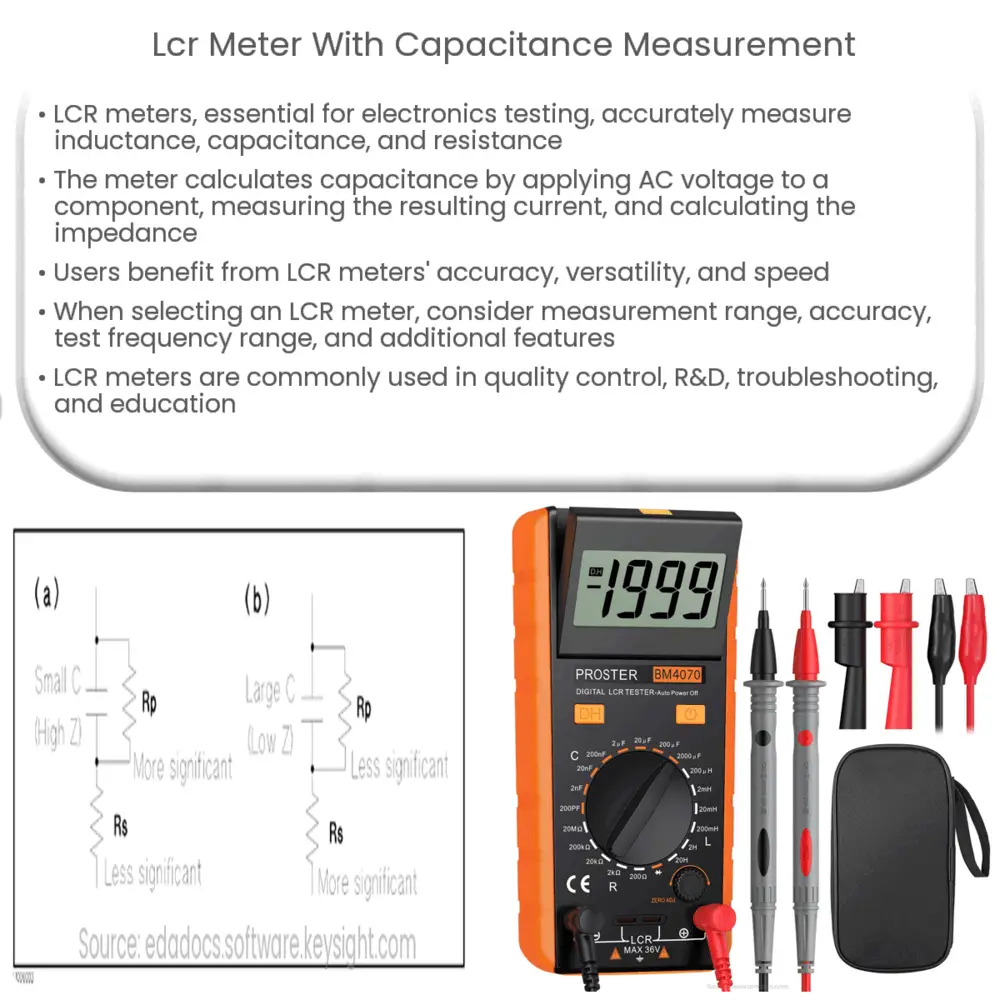LCR meters accurately measure capacitance, inductance, & resistance, making them essential for electronics testing, troubleshooting, & quality control.

LCR Meter with Capacitance Measurement: An Essential Tool for Electronics Testing
Introduction
An LCR meter is an indispensable piece of equipment used in the field of electronics for measuring the inductance (L), capacitance (C), and resistance (R) of electronic components. In this article, we will be focusing on the capacitance measurement feature of an LCR meter, exploring how it works, its applications, and the benefits it offers to users. With modern advancements in technology, LCR meters have become more versatile and accurate, making them an essential tool for electronics testing and troubleshooting.
Understanding Capacitance
Before delving into the specifics of an LCR meter with capacitance measurement, it is crucial to understand what capacitance is. Capacitance is the ability of a component, known as a capacitor, to store electrical energy in an electric field. It is measured in farads (F) and is a vital parameter to consider when designing or analyzing electronic circuits.
Capacitors are passive electronic components that store energy and discharge it when needed. They play a vital role in various applications, such as filtering, energy storage, and signal coupling. Accurately measuring a capacitor’s capacitance is crucial for ensuring the proper functioning of electronic circuits and devices.
How Does an LCR Meter Measure Capacitance?
An LCR meter with capacitance measurement operates by applying an alternating current (AC) voltage with a known frequency and amplitude to the component under test. The device then measures the resulting current through the component and calculates the impedance (Z) based on Ohm’s law (Z = V/I). Using this impedance value, the meter calculates the capacitance of the component.
LCR meters typically offer a range of test frequencies to choose from, which is essential as capacitance values can vary depending on the frequency of the applied signal. This feature allows users to obtain accurate capacitance measurements under various conditions.
Benefits of an LCR Meter with Capacitance Measurement
Utilizing an LCR meter with capacitance measurement offers several advantages for users, including:
- Accuracy: LCR meters are designed to provide highly accurate measurements of capacitance, often within a small margin of error. This accuracy is essential when working with components that require precise capacitance values for proper functioning.
- Versatility: As LCR meters can measure inductance, capacitance, and resistance, they are a versatile tool for any electronics testing and troubleshooting scenario. This versatility makes them a valuable addition to any electronics toolkit.
- Speed: Modern LCR meters can perform measurements quickly, allowing users to rapidly test multiple components or troubleshoot circuitry, saving time and effort.
Selecting the Right LCR Meter for Capacitance Measurement
When choosing an LCR meter with capacitance measurement capabilities, it is essential to consider several factors to ensure you select the right device for your needs:
- Measurement Range: Choose an LCR meter that offers a suitable capacitance measurement range for your specific applications. Some meters offer a wider range, allowing for more versatility in testing various components.
- Accuracy: Look for an LCR meter that provides the required level of accuracy for your specific tasks. Higher accuracy meters may be more expensive but are essential when working with precision components or critical applications.
- Test Frequency Range: Ensure the LCR meter offers a range of test frequencies that meet your requirements, as capacitance values can be frequency-dependent.
- Additional Features: Some LCR meters include advanced features, such as data logging, programmable test sequences, or computer connectivity. These features can enhance usability and streamline testing processes, but they may also increase the device’s cost.
Applications of LCR Meters with Capacitance Measurement
LCR meters with capacitance measurement are widely used across various industries and applications. Some common uses include:
- Quality Control: LCR meters are often used in manufacturing facilities to ensure the quality and consistency of electronic components, such as capacitors and inductors, before they are used in production.
- Research and Development: Engineers and scientists use LCR meters during the development of new electronic devices to measure and analyze the performance of components and circuit designs.
- Troubleshooting and Repair: Technicians and hobbyists utilize LCR meters to diagnose and repair faulty electronic devices by identifying faulty components or verifying the proper functioning of capacitors, inductors, and resistors.
- Education: LCR meters are used in educational settings, such as colleges and universities, to teach students about electronics and the principles of capacitance, inductance, and resistance.
Conclusion
LCR meters with capacitance measurement are an essential tool for electronics testing and troubleshooting. They offer accurate, versatile, and speedy measurements, making them invaluable for professionals and hobbyists alike. By considering factors such as measurement range, accuracy, test frequency range, and additional features, you can select the right LCR meter to meet your specific needs. With applications spanning quality control, research and development, troubleshooting and repair, and education, LCR meters with capacitance measurement capabilities are a vital addition to any electronics toolkit.

